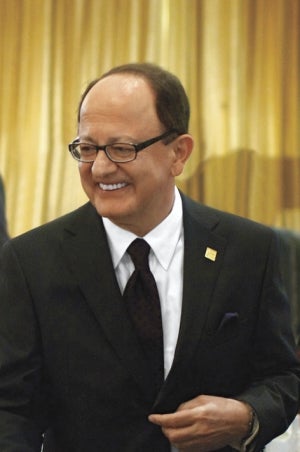Online Education Has a Rightful Place in the Academic Mission
Online learning uses technology to bring a USC graduate education to more students than ever.

When we talk about the human community at the core of a great university, an important question quickly arises: What will be the role of technology in teaching? And from this, an even more specific question follows: Will digital and immersive media make the physical campus obsolete?
Academic leaders have explored these questions in considerable depth — and with impassioned debate. Many claim that online lecture halls will eventually replace traditional universities, and that our present model of a university will undergo even more change. They foresee faculty who reach millions of individuals around the world, with students attending courses at their convenience. Some cheer these changes, while others sound an alarm: Are we seeing the demise of the traditional university?
This question will continue to spark heated discussion, but as the future rapidly becomes the present, I want to turn your attention to the model created by USC, a model that we’ve refined over several decades with quiet industry and determination. Indeed, our community has seen tremendous success in the area of online learning.
Without question, USC’s faculty has developed a global online graduate education enterprise that blazes a new path and draws on timeless values and timely innovations. It expands educational access broadly, while maintaining our all-important standards of academic rigor, integrity and quality.
Consider these numbers: Total annual revenues for online USC professional, graduate and continuing education programs are expected to exceed $100 million this year — a figure that is unprecedented for a top American research university.
Today, online education at USC reaches 5,000 remote students through master’s level degree programs and executive education programs. Within the next five years, we expect to double our enrollment and degree offerings.
These metrics are impressive and the outside world is taking notice. U.S. News & World Report ranked the USC Viterbi School of Engineering first in the nation among online graduate engineering programs and online computer information technology programs. These rankings recognize excellence in a range of areas, including peer reputation, student engagement and faculty credentials.
In addition, our USC Rossier School of Education and our USC School of Social Work have developed distinguished online graduate programs, thanks to the stellar leadership of their deans. These programs are dynamic and flexible, while meeting very real needs in our society. For example, spouses of military service members are able to pursue quality graduate education in social work, despite the prospect of frequent relocation.
While popular with students, these programs have also drawn the attention of trustees and faculty at our peer institutions. They want to study our model and grasp the principles that have guided our growth.
We tell them at USC our programs are imaginative and bold. Our faculty has eagerly experimented with models that extend our reach, and yet never compromise the value and quality of a USC degree.
We also tell them that USC will not franchise its distinctive undergraduate experience, either online or through satellite campuses abroad. The ages between 17 and 22, which coincide with the traditional undergraduate experience, represent a corridor of transformation where much of a student’s identity and lifelong affiliations are formed. Technology will enhance that experience, but never displace it.
USC’s focus, therefore, remains on master’s and graduate programs, along with executive and continuing education. Technology makes distance irrelevant, and students can learn new skills to build their careers while working and living anywhere on the planet. It also allows them to move from obsolete industries to new ones.
The world will certainly change, and technology’s place in education will continue to evolve. USC will grow with these changes and adapt with this evolution, but remain firmly rooted in its foundation of excellence.
